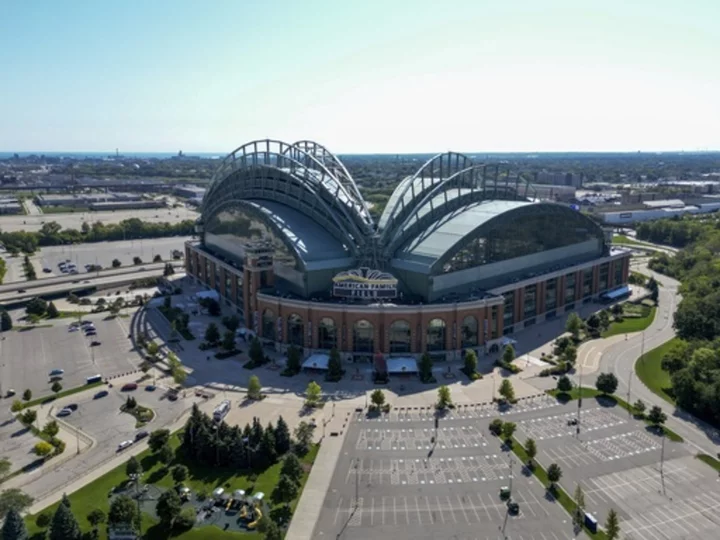MADISON, Wis. (AP) — The chief architect of a plan to hand the Milwaukee Brewers more than $614 million to cover stadium improvements defended his proposal Thursday in front of a legislative committee, promising the deal will keep the team in Milwaukee for another generation without new taxes.
Republican state Rep. Rob Brooks has developed a pair of bills that call for handing public dollars from the state, the city of Milwaukee and Milwaukee County to the team. He began a public hearing before the Assembly's state affairs committee at Wisconsin State Fair Park in West Allis by joking that he doesn't blame the panel for the Brewers' season-ending loss to the Arizona Diamondbacks on Wednesday night.
He spent the next hour and a half promoting the proposal but cautioning that it was still a work in progress.
He stressed that the package creates no new taxes, instead using income taxes on players' salaries as a funding stream. He warned that if the Brewers were to leave Wisconsin the state, the city and the county would lose tens of millions of dollars in income and sales taxes. That revenue loss could translate to dips in state aid to municipalities across the state.
Public funding for professional sports facilities is hotly debated across the country. The team’s principal owner, Mark Attanasio, has an estimated net worth of $700 million, according to Yahoo Finance. The team itself is valued at around $1.6 billion, according to Forbes. Still, the Brewers have been working for months to secure public funding for stadium repairs and upgrades.
The team so far has not threatened to leave Milwaukee if it doesn't get public help, but relocation is always a possibility if a city willing to pay the team's bills steps forward.
Democrats on the committee gave Brooks' proposal a cool reception. Rep. Tod Ohnstad, a Kenosha Democrat, questioned whether it's worth investing in baseball at all.
He said the sport is losing popularity, adding that he “tortured” himself watching the Diamondbacks sweep the Brewers out of the playoffs. He said the proposal needs substantial changes to earn his vote.
Other Democrats complained the proposal asks for too much money from the city and county.
Brooks countered that the proposal calls for winterizing the stadium so the Brewers can rent it out year-round for events such as concerts, generating more sales tax for the state and local governments.
He added that he's working on an amendment that calls for attaching a fee on tickets for non-baseball events that would be split between the state, the city and the county. He's also working on another amendment that would create a group that would study developing the stadium's parking lots into a restaurant district that would provide more tax revenue.
He argued that losing the Brewers would put the city and county in an even worse financial position. Keeping the Brewers in Milwaukee provides businesses with the certainty they need to invest in the area around the stadium, he said.
Reports commissioned by the Brewers and another by a state consultant found the stadium’s glass outfield doors, seats and concourses should be replaced. Its luxury suites and technology such as its sound system and video scoreboard need upgrades, and its signature retractable roof needs repairs. Fire suppression systems, parking lots, elevators and escalators need work, too.
Under Brooks' proposal, the state would give the team $60.8 million next fiscal year and up to $20 million each year after that into 2046. The city of Milwaukee would contribute a total of $202 million and Milwaukee County would kick in $135 million by 2050.
The team would contribute about $100 million and extend its lease at American Family Field through 2050, keeping Major League Baseball in its smallest market for another 27 years.
According to a Legislative Fiscal Bureau memo attached to the legislation, baseball operations at the stadium currently generate about $19.8 million annually in state and local taxes. That figure is expected to grow to $50.7 million annually by 2050, according to the memo.
The package has garnered support from the tourism industry, including the Tavern League of Wisconsin, a lobbying powerhouse.
Democratic Gov. Tony Evers proposed giving the team almost $300 million in the state budget in exchange for the team extending its lease by 13 years, to 2043. Evers would have pulled the money from the state’s $7 billion surplus, but Republican lawmakers killed the plan after Assembly Speaker Robin Vos said he wanted a longer lease extension.
The governor told the Wisconsin State Journal on Thursday that he's concerned about how much the city and county will have to contribute but he'd probably support any stadium proposal that comes across his desk.

